高三英语虚拟语气全国通用
2025届高三英语一轮复习语法虚拟语气课件

3.would rather 专题
would rather sb. did 宁愿让别人做一件事(虚拟语气)
My mother always tells me that she would rather I were happier. I feel upset today,so I would rather you invited me to dinner tomorrow.
虚拟语气
目录
CONTENTS
01 什么是虚拟语气 02 虚拟语气的一般用法 03 虚拟语气特殊用法
什么是虚拟语气
虚拟语气表示与事实相反或虚假的,难以实现的 情况,有时也表示主观愿望,建议或某种强烈情
感,也用虚拟语气 -.跟真的相差的远
虚拟语气的一般用法if
①如果你是我眼中的一滴泪,我就永 远不会哭泣。
只需要把已经写好的句子时态变成它的过去式就好了
If you were a tear in my tears,I would never cry. If I was a dog last night,I could sleep in bed with you. 过去式还有过去式嘛?过去完成时 Had+done If I had been a dog last night,I could sleep in bed with you. sleep→slept 对吗 错误
3.would rather 专题
would rather do sth.than do sth. 宁愿做某事而不做某事(不是虚拟语气)
I would rather marry an old lady than stay with you.
高三英语上学期虚拟语气
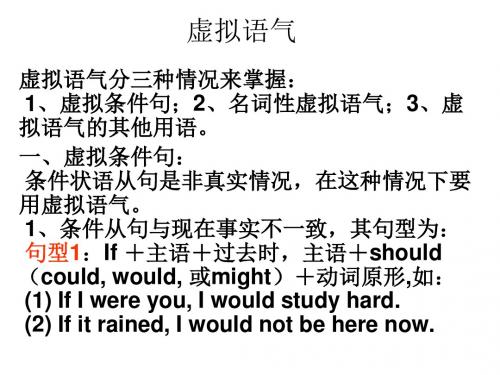
• 2、条件从句与过去事实不一致,其句型为: 句型2:If +主语+had+过去分词,主语+ should(could, would, 或might)+have +过 去分词,如: (3) If the doctor had come last night, the boy would have been saved. (4) If I had not studied hard, I would have failed in the exam last term. • 3、条件从句与将来事实不一致,其句型为: 句型3:If +主语+过去时/should +动词原形 /were to+动词原形,主语+should(could, would, 或might)+动词原形 ,如: (5) If it should rain tomorrow, we would stay at home. (6) If I were to go to the moon one day, I could see it with my own eyes. (7) If you missed the film tonight, you would feel sorry.
虚拟语气
虚拟语气分三种情况来掌握: 1、虚拟条件句;2、名词性虚拟语气;3、虚 拟语气的其他用语。 一、虚拟条件句: 条件状语从句是非真实情况,在这种情况下要 用虚拟语气。 1、条件从句与现在事实不一致,其句型为: 句型1:If +主语+过去时,主语+should (could, would, 或might)+动词原形,如: (1) If I were you, I would study hard. (2) If it rained, I would not be here now.
高考英语虚拟语气

高考英语虚拟语气在英语中,虚拟语气是一种用来表达假设、想象、期望或建议的语言形式。
虚拟语气可以用来表达我们对于某些事情的看法或观点,而这些事情可能并不是真实的。
在高考英语中,虚拟语气是一个重要的语法点,需要考生们熟练掌握并运用。
一、虚拟语气的分类虚拟语气可以分为两类:现在虚拟语气和过去虚拟语气。
现在虚拟语气用于表达对于现在或未来的假设,而过去虚拟语气则用于表达对于过去的假设。
二、虚拟语气的构成虚拟语气的构成主要是通过谓语动词的变化来实现的。
在现在虚拟语气中,常用的谓语动词包括“would”、“could”、“should”、“might”等;在过去虚拟语气中,常用的谓语动词包括“would have done”、“could have done”、“should have done”、“might have done”等。
三、虚拟语气的使用场合虚拟语气通常用于表达主观的看法或建议,如表达对某件事情的遗憾、不满或期望。
在高考英语中,虚拟语气常常出现在完形填空、阅读理解、语法填空和写作等题型中。
四、虚拟语气的解题技巧1、理解语境:在理解题目语境的基础上,判断应该使用现在虚拟语气还是过去虚拟语气。
2、分析谓语动词:根据谓语动词的变化形式,判断应该使用哪个虚拟语气的形式。
3、关键词:在题目中寻找相关的关键词,如“如果”、“要是我”、“要是能”等,这些关键词通常会提示考生需要使用虚拟语气。
4、排除干扰项:在解题时,要排除那些与虚拟语气无关的选项,以免被干扰。
虚拟语气是高考英语中的一个重要考点,考生们需要熟练掌握其构成和用法。
只有在实际运用中多加练习,才能更好地理解和掌握这一语法点。
高考英语虚拟语气在英语中,虚拟语气是一种用来表达假设、想象、期望或建议的语言形式。
虚拟语气可以用来表达我们对于某些事情的看法或观点,而这些事情可能并不是真实的。
在高考英语中,虚拟语气是一个重要的语法点,需要考生们熟练掌握并运用。
高三英语虚拟语气试题答案及解析

高三英语虚拟语气试题答案及解析1. Thanks a lot. But for your text message, I___my ID card at home this morning.A.would leave B.might forgetC.would have left D.should have forgotten【答案】C【解析】考查虚拟语气。
过去事实相反的虚拟语气,因为事情已经发生了,所以用与过去的事实相反的虚拟语气,主句要用would have + 过去分词。
句意:非常感谢,要不是你的短信,今天早上我会忘记我的身份证在家的。
故C正确。
【考点】考查虚拟语气2. The scientists recommend that studies ________ to find out what side effects the medicine might cause.A.be done B.should doC.will be done D.are done【答案】A【解析】A[recommend后接宾语从句时,谓语动词用虚拟语气,should可以省略。
此题中因为studies是动作的承受者,所以用被动形式。
]3. Had I known about this computer program, a huge amount of time and energy ________. A.would have been saved B.had been savedC.will be saved D.was saved【答案】A【解析】A[句意:如果我早知道这个电脑程序,就可以节省大量的时间和精力了。
根据句子的倒装特征判断此处是省略了if的虚拟语气,原形是:If I had known about this computer program, a huge amount of time and energy ________.故选择A。
高三英语虚拟语气知识点
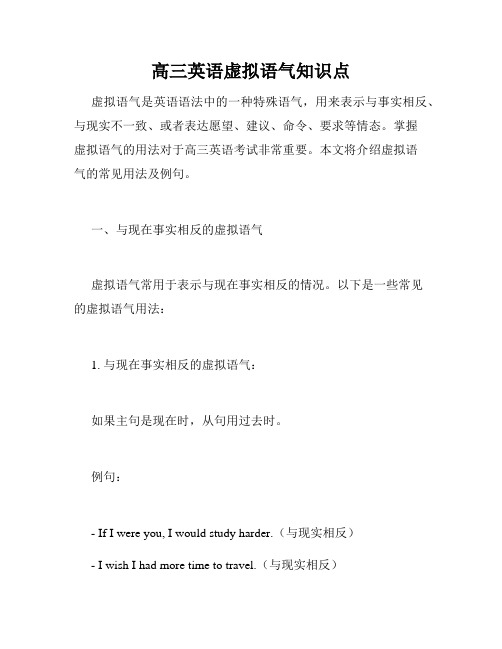
高三英语虚拟语气知识点虚拟语气是英语语法中的一种特殊语气,用来表示与事实相反、与现实不一致、或者表达愿望、建议、命令、要求等情态。
掌握虚拟语气的用法对于高三英语考试非常重要。
本文将介绍虚拟语气的常见用法及例句。
一、与现在事实相反的虚拟语气虚拟语气常用于表示与现在事实相反的情况。
以下是一些常见的虚拟语气用法:1. 与现在事实相反的虚拟语气:如果主句是现在时,从句用过去时。
例句:- If I were you, I would study harder.(与现实相反)- I wish I had more time to travel.(与现实相反)2. 表达建议、要求或命令等的虚拟语气:主句用“should”或“ought to”引导,从句用动词原形。
例句:- It is necessary that she should arrive on time.(建议)- He demanded that they leave immediately.(命令)二、与过去事实相反的虚拟语气虚拟语气还可以用来表示与过去事实相反的情况。
以下是一些常见的虚拟语气用法:1. 与过去事实相反的虚拟语气:如果主句是过去时,从句用过去完成时。
例句:- If he had studied harder, he would have passed the exam.(与过去事实相反)- I wish I hadn't eaten so much.(与过去事实相反)2. 表达愿望、建议或命令等的虚拟语气:主句用“should”或“ought to”引导,从句用动词原形或过去时。
例句:- It is high time that he applied for a job.(建议)- I wish he would stop talking.(愿望)三、与将来事实相反的虚拟语气虚拟语气还可以用来表示与将来事实相反的情况。
以下是一些常见的虚拟语气用法:1. 与将来事实相反的虚拟语气:如果主句是将来时,从句用过去完成时。
高考英语虚拟语气(23张)
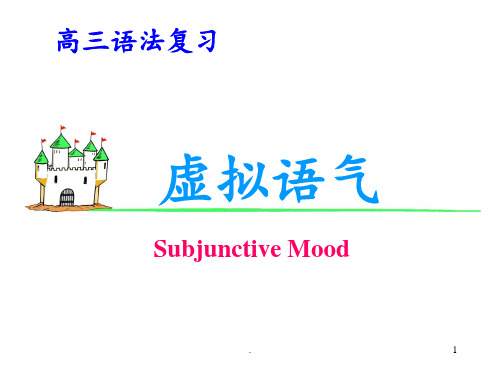
.
5
C. would , ask
D. did, ask
典型例题
注意1、陈述语气与虚拟语气
1) The volleyball match will be put off if it ___B__. A. will rain B. rains C. rained D. is rained
该句为陈述语气,因为主句用的是 will be put off。真实 条件句主句为将来时,从句用一般现在时代将来时。
2) --- Would you have called her up ___A__ possible? --- Yes, but I _____ busy doing my homework.
A. had it been … was
B. if it was … were
C. if it had been … had been D. if it were … would be
Had I (=If I had) known about it,I would have told
ou.
Should anyone (=If anyone should )call, please take
a message.
hat would have happened, ____C_ as far as the river bank?
A. lies
B. lay C. had lain D. should lie
(lie 躺. ,lay, lain)
12
2. 在某些动词后的宾语从句中需用should+动词 原形的虚拟语气形式。“should”可以省略。 常见的动词有:一个坚持insist; 两个命令order, command ; 三条建议suggest , advise, propose; 四项要求demand, request, require, desire;
高三英语语法讲解----虚拟语气

(1)表示说话人所说的话不是事实,而是一种假设、猜测、怀疑 等,假设是不可能或者不大可能发生或实现的;
(2)表示说话人的愿望、要求、命令、建议等
02 related concept
虚拟语气的基本用法:
if条件句中的虚拟语气:
虚拟语气的基本用法:
在if引导的虚拟条件状语从句中,谓语动词含有had、were、should时, 可以把if省略,将had、were、should、could提到句首,变成倒装句。 If I were in your position,I would do the same. →Were I in your position,I would do the same. 假如我处在你的位置,我也会这样干的。 If you had come earlier,you would have caught the bus. →Had you cght the bus. 如果你来得早些,你就会赶上公共汽车了。 If it should rain tomorrow,we would not go climbing. →Should it rain tomorrow,we would not go climbing. 如果明天下雨的话,我们就不去爬山了。
If从句
与现在相反
did(be用were)
与过去相反 与将来相反
had +done
did(be用were) were to+ do should +do
主句
would /should /could / might
+do
would /should /could / might +have + done
高中英语虚拟语气(绝对全)

If my brother were here, everything would be all right. 要是我哥哥在这儿,一切都没问题虚拟语气表示所说的话只是一种主观愿望、假设或建议等。
虚拟语气的重点是:虚拟语气的特殊形式,即用来表示要求、建议、命令、提议、意愿等的主语从句、宾语从句、表语从句和同位语从句中的虚拟形式,含蓄条件句中的虚拟语气和表示愿望的虚拟形式等。
(一)虚拟语气的常见句型●与现在事实相反的虚拟语气与现在相反的虚拟语气的结构为:条件句动词为were或动词的过去式,主句为would/should/could/might+动词原形了。
If you had taken my advice,you wouldn't (couldn’t) have failed in the exam. 如果你按●与过去事实相反的虚拟语气与过去相反的虚拟语气的结构为:从句用had+过去分词,主句用would/should/could/might+have done照我的建议去做,你一定不会(不可能)考试不及格。
●与将来事实相反的虚拟语气If it were Sunday tomorrow, I should (would,could,might) go to see my grandmother. 与将来相反的虚拟语气的结构为:从句谓语动词为动词过去式或“should+动词原形”或“were to+动词原形”,主句为would/could/might +动词原形如果明天是星期天,我就(可能)去看望我奶奶。
If it were to snow this evening, they would not go out. 如果今晚下雪,他们将不出去了。
●省略if形式的虚拟语气有时条件从句中的动作和主句中的动作发生的时间不一致(表示错综时间的虚拟语气),省略连词if。
在书面语中,如果虚拟条件从句中有were,had 或should,可以把if省略,把这几个词放到主语之前,构成主谓倒装。
高考虚拟语气用法归纳
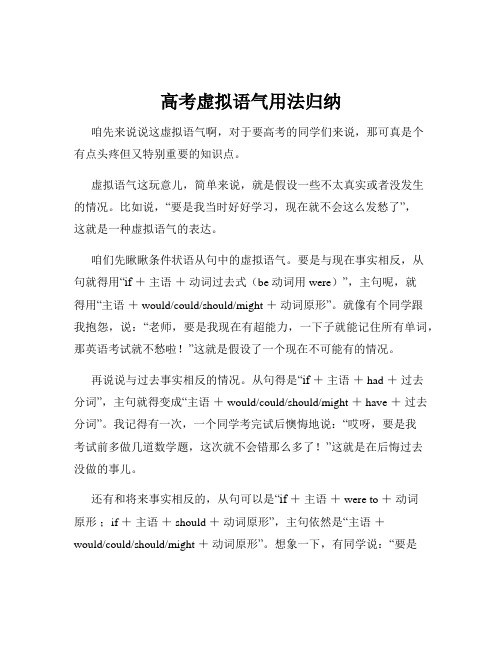
高考虚拟语气用法归纳咱先来说说这虚拟语气啊,对于要高考的同学们来说,那可真是个有点头疼但又特别重要的知识点。
虚拟语气这玩意儿,简单来说,就是假设一些不太真实或者没发生的情况。
比如说,“要是我当时好好学习,现在就不会这么发愁了”,这就是一种虚拟语气的表达。
咱们先瞅瞅条件状语从句中的虚拟语气。
要是与现在事实相反,从句就得用“if +主语+动词过去式(be 动词用 were)”,主句呢,就得用“主语+ would/could/should/might +动词原形”。
就像有个同学跟我抱怨,说:“老师,要是我现在有超能力,一下子就能记住所有单词,那英语考试就不愁啦!”这就是假设了一个现在不可能有的情况。
再说说与过去事实相反的情况。
从句得是“if +主语+ had +过去分词”,主句就得变成“主语+ would/could/should/might + have +过去分词”。
我记得有一次,一个同学考完试后懊悔地说:“哎呀,要是我考试前多做几道数学题,这次就不会错那么多了!”这就是在后悔过去没做的事儿。
还有和将来事实相反的,从句可以是“if +主语+ were to +动词原形;if +主语+ should +动词原形”,主句依然是“主语+would/could/should/might +动词原形”。
想象一下,有同学说:“要是明天世界末日,今天我就啥也不学,尽情玩!”虽然这事儿不太可能,但就是这种假设的虚拟语气。
虚拟语气在宾语从句里也有讲究。
比如说,wish 后的宾语从句,与现在事实相反用一般过去时;与过去事实相反用过去完成时;与将来事实相反用 would/could +动词原形。
我曾经听到一个同学许愿说:“真希望我现在是个学霸,啥题都会做!”这就是典型的与现在事实相反的虚拟语气表达。
还有在主语从句中,“It is +形容词(或过去分词)+that”结构中,如果形容词或过去分词表示“建议、要求、命令”等,从句的谓语动词要用“should +动词原形”,should 可以省略。
高考英语虚拟语气(共41张)
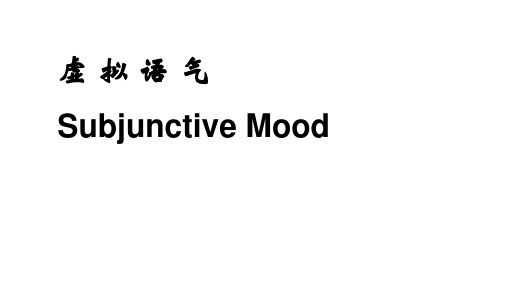
语气概念:
谓语动词用不同的形式表示说话人的不同意图,这种形式称 为语气。 1. 陈述语气:用来陈述一个事实,或提出一种看法,有肯定、 否定、疑问、感叹等形式。
He is late for class.
He is not interested in classical music. 2. 祈使语气:用来表示请求、邀请、命令、警告或劝告等 (动词常用原形) Don’t be late! 3. 虚拟语气:表示说话人所说的不是事实,而是一种假设、 愿望、怀疑或推测。
优秀ppt公开课ppt免费课件下载免费 课件高 考英语 虚拟语 气(共 41张)
优秀ppt公开课ppt免费课件下载免费 课件高 考英语 虚拟语 气(共 41张)
Without electricity, human being life ______ quite different today. A. is B. will be C. would have been D. would be
优秀ppt公开课ppt免费课件下载免费 课件高 考英语 虚拟语 气(共 41张)
优秀ppt公开课ppt免费课件下载免费 课件高 考英语 虚拟语 气(共 41张)
6.情态动词+ have done
could have done 本来可以做,而实际上未做- - might have done 本来可能/可能做过 - - should / ought to have done 本来应该做 - - shouldn’t / ought not to have done 本不该做 - would have done 本来会去做----
A. is not polluted B. would not be polluted C. had not been polluted D. would not have been polluted
高考语法虚拟语气

高考语法虚拟语气虚拟语气在高考语法考试中占据很重要的位置。
虚拟语气是用来表示非真实的、不确定的、假设的情况,或表达愿望、建议、命令等的语气。
下面我将详细介绍虚拟语气的各种形式及其用法。
一、虚拟语气的情态动词虚拟语气通常由情态动词来表示,包括:1. should + 动词原形,可以表示建议或命令。
2. would + 动词原形,可以表示请求或愿望。
3. could + 动词原形,可以表示能力、请求或愿望。
4. might + 动词原形,可以表示可能性。
5. had + 过去分词,可以表示对过去情况的假设。
6. were + 动词原形,多用于第二和第三人称单数的句子中,表示假设或愿望。
二、虚拟语气的用法1. 虚拟条件句虚拟条件句常用在表示条件的从句中,表示与现在或将来事实相反的假设情况。
主句中常使用情态动词或“would”来表示假设的结果。
例句1:If I were a bird, I would fly in the sky.(假设的情况是我是一只鸟,结果是我会在天空中飞翔。
)例句2:If you had studied harder, you would have passed the exam.(假设的情况是你学习更努力了,结果是你已经通过考试了。
)2. 虚拟语气用于表达命令、建议、要求、要求等虚拟语气还常用于表达命令、建议、要求等。
在这种情况下,常用“should + 动词原形”或“would + 动词原形”。
例句3:You should help your parents with the housework.(你应该帮助你的父母做家务。
)例句4:I wish you would listen to me.(我希望你能听我说。
)3. 虚拟语气用于表达愿望虚拟语气还常用于表达愿望,其中“would”是常见的情态动词。
例句5:I wish I could play the piano.(我希望我能弹钢琴。
高考英语中虚拟语气的用法和注意点是什么
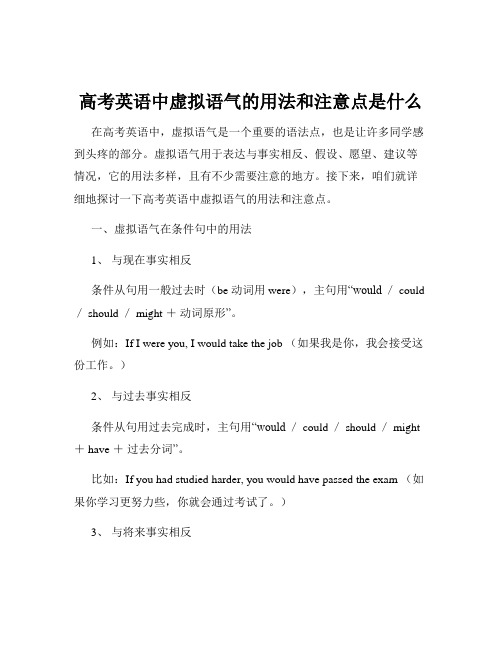
高考英语中虚拟语气的用法和注意点是什么在高考英语中,虚拟语气是一个重要的语法点,也是让许多同学感到头疼的部分。
虚拟语气用于表达与事实相反、假设、愿望、建议等情况,它的用法多样,且有不少需要注意的地方。
接下来,咱们就详细地探讨一下高考英语中虚拟语气的用法和注意点。
一、虚拟语气在条件句中的用法1、与现在事实相反条件从句用一般过去时(be 动词用 were),主句用“would / could / should / might +动词原形”。
例如:If I were you, I would take the job (如果我是你,我会接受这份工作。
)2、与过去事实相反条件从句用过去完成时,主句用“would / could / should / might + have +过去分词”。
比如:If you had studied harder, you would have passed the exam (如果你学习更努力些,你就会通过考试了。
)3、与将来事实相反条件从句有三种形式:① should +动词原形;② were to +动词原形;③一般过去时。
主句用“wou ld / could / should / might +动词原形”。
举个例子:If it should rain tomorrow, we would stay at home (要是明天下雨,我们就待在家里。
)二、虚拟语气在宾语从句中的用法1、 wish 后的宾语从句表示与现在事实相反,用一般过去时;表示与过去事实相反,用过去完成时;表示与将来事实相反,用“would / could +动词原形”。
例如:I wish I were as tall as you (我希望我和你一样高。
)2、表示“建议、要求、命令”等动词后的宾语从句这类动词有suggest(建议)、advise(建议)、insist(坚持要求)、order(命令)、demand(要求)等,从句谓语用“should +动词原形”,should 可以省略。
高中英语 高考英语 虚拟语气

虚拟语气I. 含If 条件句的主从复合句II. 谓语动词由“should+do”构成的虚拟语气IV. It is (high) time that...句型中用“did/should+do”表虚拟It is time that we should have a discussion.It is time that we took measures to stop pollution.【即学即练】完成下面短文,然后朗读或背诵,体会虚拟语气的用法。
I am a middle school student. I have many dreams. If there 1.________ (be) not so much homework, I would have more time to do what I like to do. How I wish I 2.________ (listen) to my favourite music for an hour a day and 3.________(play) table tennis for an hour in the morning. It's my desire that we 4.________ (hold) evening parties or 5.________(organize) some interesting activities at weekend. I suggest that t here 6.________ (be) not so many tests. You can imagine what life 7.________ (will) be if I8.________ (realize) my dream. But I must face the exams. Without good marks, I 9.________ (will) not enter my ideal university. Anyway, it's high time that I 10.________ (encourage) myself and worked hard from now on.1.were 2.listened 3.played 4.(should) hold5.(should) organize 6.(should) be 7.would8.realized/ should realize/ were to realize 9.would10.encouraged。
高三英语虚拟语气1

虚拟语气(1)(一)与现在事实相反Eg. If I were a boy, I would be a better man.If she had the magic power, she could make herself back to her childhood.归纳:If sb.________ sth, sb. _________do sth.1 如果我是你,我就告诉他真相。
If I __________ you, I ____________ tell him the truth.2 要是我哥哥在这儿,一切都会很顺利的.If my brother ________ here, everything ________ be all right.(二)与过去的事实相反If my brother had been here yesterday , everything would have been all right.归纳:If sb. ______…, sb.would/could/might/should __________…(三)与将来相反If sb.______________________ sth, sb. would / could / might/should do …如果人类在2015年灭亡,地球将是什么样?If the humans ________________ (die out) in 2015, what the earth ________ (be) like?!如果明天下雪,我们就可以堆雪人了。
If it _________ (snow) tomorrow , we ________ make a snowman.如果明天是春节的话,我就可能拿到很多零花钱了.If it ________(be) the Spring Festival tomorrow, I _______ get a lot of pocket money.总结:If sb sb...现在过去将来(四)1.若虚拟条件句中含有were, had(助动词), should,可以将if 省去,而将were, had, should提到句首。
高考英语虚拟语气专项讲解及练习含答案
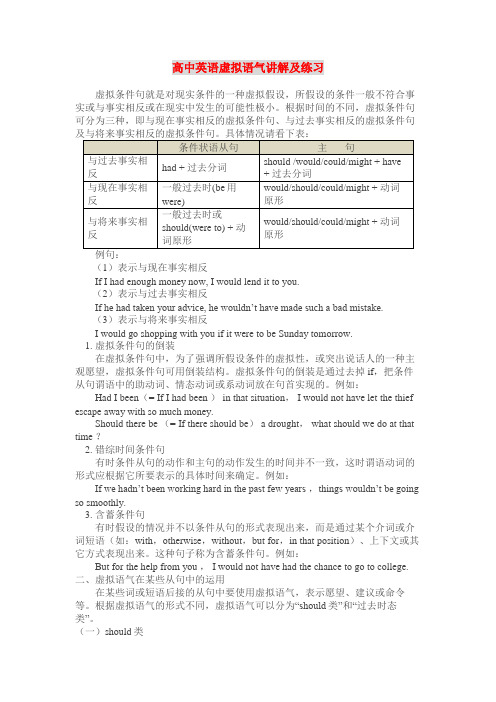
高中英语虚拟语气讲解及练习虚拟条件句就是对现实条件的一种虚拟假设,所假设的条件一般不符合事实或与事实相反或在现实中发生的可能性极小。
根据时间的不同,虚拟条件句可分为三种,即与现在事实相反的虚拟条件句、与过去事实相反的虚拟条件句(1)表示与现在事实相反If I had enough money now, I would lend it to you.(2)表示与过去事实相反If he had taken your advice, he wouldn’t have made such a bad mistake.(3)表示与将来事实相反I would go shopping with you if it were to be Sunday tomorrow.1. 虚拟条件句的倒装在虚拟条件句中,为了强调所假设条件的虚拟性,或突出说话人的一种主观愿望,虚拟条件句可用倒装结构。
虚拟条件句的倒装是通过去掉if,把条件从句谓语中的助动词、情态动词或系动词放在句首实现的。
例如:Had I been(= If I had been ) in that situation, I would not have let the thief escape away with so much money.Should there be (= If there should be) a drought, what should we do at that time ?2. 错综时间条件句有时条件从句的动作和主句的动作发生的时间并不一致,这时谓语动词的形式应根据它所要表示的具体时间来确定。
例如:If we hadn’t been working hard in the past few years ,thing s wouldn’t be going so smoothly.3. 含蓄条件句有时假设的情况并不以条件从句的形式表现出来,而是通过某个介词或介词短语(如:with,otherwise,without,but for,in that position)、上下文或其它方式表现出来。
高考虚拟语气
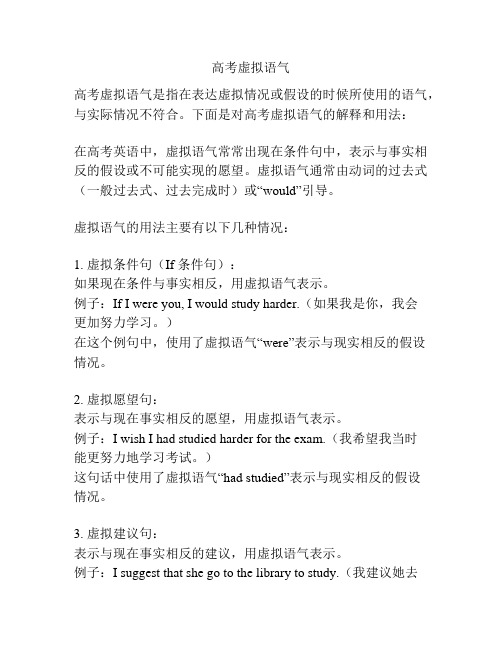
高考虚拟语气
高考虚拟语气是指在表达虚拟情况或假设的时候所使用的语气,与实际情况不符合。
下面是对高考虚拟语气的解释和用法:
在高考英语中,虚拟语气常常出现在条件句中,表示与事实相反的假设或不可能实现的愿望。
虚拟语气通常由动词的过去式(一般过去式、过去完成时)或“would”引导。
虚拟语气的用法主要有以下几种情况:
1. 虚拟条件句(If 条件句):
如果现在条件与事实相反,用虚拟语气表示。
例子:If I were you, I would study harder.(如果我是你,我会
更加努力学习。
)
在这个例句中,使用了虚拟语气“were”表示与现实相反的假设
情况。
2. 虚拟愿望句:
表示与现在事实相反的愿望,用虚拟语气表示。
例子:I wish I had studied harder for the exam.(我希望我当时
能更努力地学习考试。
)
这句话中使用了虚拟语气“had studied”表示与现实相反的假设
情况。
3. 虚拟建议句:
表示与现在事实相反的建议,用虚拟语气表示。
例子:I suggest that she go to the library to study.(我建议她去
图书馆学习。
)
这个例句中使用了虚拟语气“go”表示与现实相反的建议情况。
总之,高考虚拟语气在英语考试中常常出现,需要我们掌握相关的用法和规则,并能正确运用。
只有熟练掌握虚拟语气的使用方法,才能在高考中取得更好的成绩。
高三英语高考典型例句帮你突破情态动词的用法全国通用
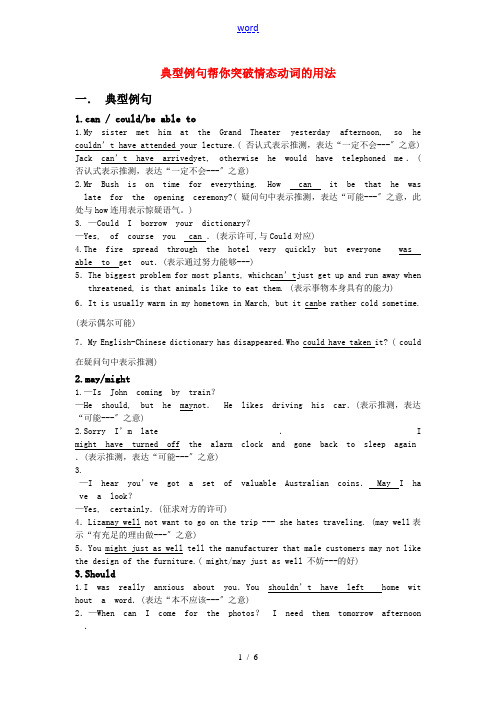
典型例句帮你突破情态动词的用法一.典型例句1.can / could/be able to1.My sister met him at the Grand Theater yesterday afternoon, so he couldn’t have attended your lecture.( 否认式表示推测,表达“一定不会---〞之意) Jack can’t have arrivedyet, otherwise he would have telephoned me.( 否认式表示推测,表达“一定不会---〞之意)2.Mr Bush is on time for everything. How can it be that he was late for the opening ceremony?( 疑问句中表示推测,表达“可能---〞之意,此处与how连用表示惊疑语气。
)3. —Could I borrow your dictionary?—Yes, of course you can .(表示许可,与Could对应)4.The fire spread through the hotel very quickly but everyone was able to get out.(表示通过努力能够---)5.The biggest problem for most plants, whichcan’tjust get up and run away when threatened, is that animals like to eat them. (表示事物本身具有的能力)6.It is usually warm in my hometown in March, but it canbe rather cold sometime. (表示偶尔可能)7.My English-Chinese dictionary has disappeared.Who could have taken it? ( could 在疑问句中表示推测)2.may/might1.—Is John coming by train?—He should, but he maynot.He likes driving his car.(表示推测,表达“可能---〞之意)2.Sorry I’m late.I might have turned off the alarm clock and gone back to sleep again .(表示推测,表达“可能---〞之意)3.—I hear you’ve got a set of valuable Australian coins.May I ha ve a look?—Yes, certainly.(征求对方的许可)4.Lizamay well not want to go on the trip --- she hates traveling. (may well表示“有充足的理由做---〞之意)5.You might just as well tell the manufacturer that male customers may not like the design of the furniture.( might/may just as well 不妨---的好)3.Should1.I was really anxious about you.You shouldn’t have left home wit hout a word.(表达“本不应该---〞之意)2.—When can I come for the photos?I need them tomorrow afternoon .—They should be ready by 12:00.(表达“按道理应该〞之意)3.You can’t imagine that a well-behaved gentleman should be so rude to a lady.( 表示“竟然〞之意)4.Ought toThere was a lot of fun at yesterday’s party.You ought to have come,but why didn’t you?( ought to have done 本应该做而未做)5.Shall3. 一What does the sign over there read?一“No person shallsmoke or carry a lighted cigarette,cigar or pipe in this area.〞(用于第三人称, 在条约、规定、法令等文件中表示义务或规定,表示“应, 必须〞之意。
高三英语一轮复习写作专题:委婉动人的“虚拟语气”
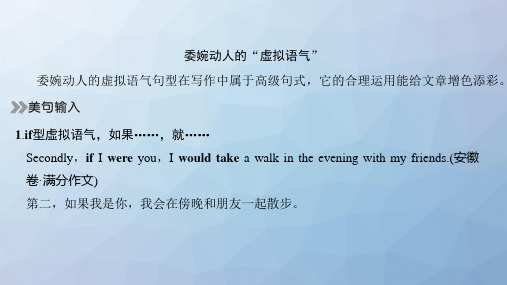
2.wish型虚拟语气,希望…… Besides,I wish there wouldn’t be too many students in a class. 另外,我希望一个班不会有太多的学生。(全国卷Ⅰ·满分作文)
3.as if/though型虚拟语气,好像……
Everything in my childhood crowded upon my mind as if/though they had just happened. 童年的一切一下子涌入我的大脑,仿佛刚刚发生似的。
choice.I wish 1.__I _c_o_u_ld__b_e_co_m__e_a__d_u_s_tm__a_n (我能成为一名环卫工人) because 2.__I_w_i_s_h_I_ _c_o_u_l_d_m__a_k_e_o_u_r_c_i_ty__a_m__o_re__b_e_a_u_ti_fu_l_p_l_a_c_e_t_o_l_iv_e__in__ (我希望我能把我们的城市变成一个 更美的居住的地方).If I were a dustman,3.__I_w_o_u_l_d_m__a_k_e_o_u_r_c_i_ty__c_le_a_n_e_r_ (我会让我们的
11
VIP用户有效期内可使用共享文档下载特权下载任意下载券标价的文档(不含付费文档和VIP专享文档),每下载一篇共享文档消耗一个共享文档下载特权。
年VIP
月VIP
连续包月VIP
享受100次共享文档下载特权,一次发放,全年 赠送的共享文档下载特权自VIP生效起每月发放一次,每次发放的特
内有效
权有效期为1个月,发放数量由您购买的VIP类型决定。
4.If _y_o_u__h_a_d_c_o_m__e_e_a_rl_ie_r_,you _w__o_u_ld_/_c_o_u_ld__h_a_v_e_c_a_u_g_h_t_ the train. 如果你来早一点,就会赶上那班列车了。
高三英语练习虚拟语气
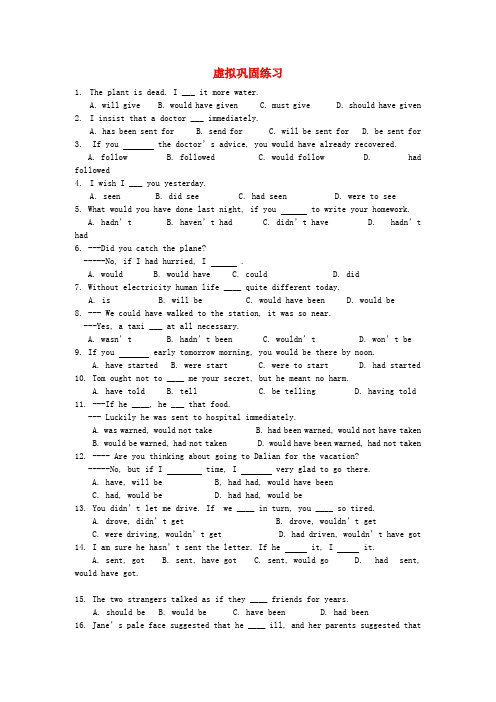
虚拟巩固练习1.The plant is dead. I ___ it more water.A. will giveB. would have givenC. must giveD. should have given2.I insist that a doctor ___ immediately.A. has been sent forB. send forC. will be sent forD. be sent for3. If you the doctor’s advice, you would have already recovered.A. followB. followedC. would followD. had followed4.I wish I ___ you yesterday.A. seenB. did seeC. had seenD. were to see5. What would you have done last night, if you to write your homework.A. hadn’tB. haven’t hadC. didn’t haveD. hadn’t had6. ---Did you catch the plane?-----No, if I had hurried, I .A. wouldB. would haveC. couldD. did7. Without electricity human life ____ quite different today.A. isB. will beC. would have beenD. would be8. --- We could have walked to the station, it was so near.---Yes, a taxi ___ at all necessary.A. wasn’tB. hadn’t beenC. wouldn’tD. won’t be9. If you early tomorrow morning, you would be there by noon.A. have startedB. were startC. were to startD. had started10. Tom ought not to ____ me your secret, but he meant no harm.A. have toldB. tellC. be tellingD. having told11. ---If he ____, he ___ that food.--- Luckily he was sent to hospital immediately.A. was warned, would not takeB. had been warned, would not have takenB. would be warned, had not taken D. would have been warned, had not taken12. ---- Are you thinking about going to Dalian for the vacation?-----No, but if I time, I very glad to go there.A. have, will be B, had had, would have beenC. had, would beD. had had, would be13. You didn’t let me drive. If we ____ in turn, you ____ so tired.A. drove, didn’t getB. drove, wouldn’t getC. were driving, wouldn’t getD. had driven, wouldn’t have got14. I am sure h e hasn’t sent the letter. If he it, I it.A. sent, gotB. sent, have gotC. sent, would goD. had sent, would have got.15. The two strangers talked as if they ____ friends for years.A. should beB. would beC. have beenD. had been16. Jane’s pale face suggested that he ____ ill, and her parents suggested thatshe ____ a medical examination.A. be, should haveB. was, haveC. should be, hadD. was, has17. When he was there, he ____ go to that coffee shop at the corner after work everyday.A. wouldB. shouldC. had betterD. might18.____ for the free tickets, I would not have gone to the films so often.A. If it is notB. Were it notC. Had it not beenD. If they werenot19. There was a lot of fun at yesterday’s party. You ____ come, but why didn’tyou?A. must haveB. shouldC. need haveD. ought to have20.If he ____ quietly as the doctor instructed, he wouldn’t suffer so much now.A. liesB. layC. had lainD. should lie21. How I wish every family ___ a large house with a garden.A. hasB. hadC. will haveD. had had22. There was plenty of time. She ____.A.ne edn’t have hurriedB.couldn’t have hurriedC. must not hurryD. mustn’thave hurried23. It was necessary that he about what had happened.A. be toldB. was toldC. should tellD. tell24. It was strange that we short of water in the country where it was always raining.A. areB. beC. should beD. both B and C25. You any difficulty now, if you had made a more careful plan.A. won’t meet withB. would not meet withC. would not have met withD. have not met with26. .He did his best in everything, he would not have been what he was.A. andB. butC. otherwiseD. but that27. ---You should have gone to the show with us yesterday. It is very good.----I wished I , but I was busy with my report.A. hadB. didC. could haveD. were28. ---- Would you have told him the answer, if possible?-----Yes, I would have, but I very busy.A. had beenB. wereC. wasD. would be29. If only I his advice, but I am sorry I did.A. would not takeB. would not have takenC. did not takeD. had not taken30. It is time we to the concert.A. went B, go C. will go D. should go虚拟巩固练习答案1---5 DDDCD 6---10 BDACA 11---15BCDDD 16---20 BACDC21---25 BACDB 26---30 CCCDA。
- 1、下载文档前请自行甄别文档内容的完整性,平台不提供额外的编辑、内容补充、找答案等附加服务。
- 2、"仅部分预览"的文档,不可在线预览部分如存在完整性等问题,可反馈申请退款(可完整预览的文档不适用该条件!)。
- 3、如文档侵犯您的权益,请联系客服反馈,我们会尽快为您处理(人工客服工作时间:9:00-18:30)。
虚拟语气动词语气是用来表明说话人的看法和态度的。
英语中的语气有三种:⒈ 陈述语气:表示说话人认为他所表述的是事实,可用于陈述句、疑问句和感叹句,可以是肯定的、也可以是否定的。
如:If he comes here, I shall tell him.如果他来这里,我会告诉他。
(他很可能来)⒉ 祈使语气:表示对说话对方的要求、命令、请求、警告等,用于祈使句中。
如:Lock up the door.把门锁上。
(表达命令)⒊ 虚拟语气:表示所说的话是不是事实,或者是不可能发生的情况,而是一种愿望、建议或与事实相反的假设。
如:I wish he could come.我希望他能来。
(表达愿望)He suggested that we ( should ) come another day.他建议我们改天来。
(表建议)虚拟语气在条件句中的应用:英语中if 从句有两种:一种是以陈述语气叙述的叫做真实条件句,说明所提出的假想是可以实现的;另一种是以虚拟语气叙述的,叫非真实条件句,说明所提出的假想实现的可能性极小或与事实相反。
这种虚拟语气一般因所指的时间的不同而分三种情况:⒈表示与现在事实相反:If + 从句主语+ 动词的过去式……,主语+should/ would/ could/ might + 动词原形……(be 一般用were)如:①If I were you, I would go by plane.如果我是你,我将坐飞机去。
(In fact I am not you. )②If he were here, he would decide what to do.如果他在这里,他会决定做什么。
(In fact he isn’t here.)③If I had the letter at hand, I would read it.如果我手头有这封信的话,我会读它的。
(In fact I don’t have the letter at hand.)④If she knew about it now, she would come.如果她现在知道这件事的话,她会来的。
(In fact she doesn’t know about it.)⑤If he had time, he would go with you.如果他有时间,他会同你一起去的。
(In fact he is very busy, so he can’t go withyou.)⒉表示与过去事实相反:If + 从句主语+ had + 过去分词……,主语+should/ would/ could/ might +have +过去分词……如:①If he had come here yesterday, I should have told him.如果他昨天到这里来,我早就告诉他了。
(Fact: He did not come and I did not tell him.)②If I had taken his advice, I wouldn’t have made such a mistake.如果我当时接受了他的劝告,我是不会犯那样一个错误的。
(Fact: I didn’t take his advice and I made such a mistake.)③If I hadn’t been so busy last Monday, I would have called her.如果我上周一不忙的话,我早就给她打电话了。
(Fact: I was busy last Monday and I didn’t call her.)⒊与将来事实可能相反:If + 从句主语+ ①动词的过去式/ ②should +动词原形/ ③were to +动词原形, 主语+ should/ would/ could/ might + 动词原形…如:①If it should snow/snowed/were to snow tomorrow, I would not go out.如果明天下雪的话,我就不出去了。
(But I know it won’t snow tomorrow.)②If he failed/should fail/were to fail, he would try again.如果他失败的话,他会再试一次。
(I know that most probably he won’t fail.)③If I had time next year, I would study German.如果我明年有时间的话,我就学德语。
(I know that most probably I won’t have time next year.)◆在书面语中,有时if虚拟从句可使用倒装形式,方法是:如果if从句中含有were, had或should时,把条件从句中的if省略,将were/had/ should移至主语之前。
如:①If I were in his place, I should learn to drive.→Were I in his place, I should learn to drive.如果我处于他的地位,我一定学开车。
②If it should snow tomorrow, the meeting would be put off.→Should it snow tomorrow, the meeting would be put off.如果明天下雪,会议将会延期。
③If they had helped us, we would have succeeded.→Had they helped us, we would have succeeded.如果他们帮助了我们,我们早就成功了。
④If it were to snow tomorrow, what would you do?→Were it to snow tomorrow, what would you do?万一明天下雪的话,你怎么办?◆如果从句和主句所表示的动作发生的时间不一致,例如:一个与过去事实相反,另一个与现在事实相反,动词的虚拟语气形式应根据所指的实际时间来选用。
如:①If he were alive, he might have finished his scientific researches on the bridge-building three years ago.如果他现在还活着,他可能三年前就完成了他的桥梁建筑科研工作了。
(从句所表示的动作与现在事实相反,主句所表示的动作与过去事实相反)②If you had followed his advice, you would not be in trouble now.如果你当初听从他的建议,你现在就不会陷入这种困境了。
(从句所表示的动作与过去事实相反,主句所表示的动作与现在事实相反)③If I had followed the doctor’s advice, I would be quite all right now.如果我当时听从了医生的建议,我现在就完全恢复了健康。
(从句所表示的动作与过去事实相反,主句所表示的动作与现在事实相反)④If I were you, I would have gone with her.如果我是你,我早就和她一起去了。
(从句表示与现在事实相反,主句所表示的动作与过去事实相反)◆有时假设的情况并不以条件从句表示出来,而是通过一个介词短语来表示。
这被称之为含蓄虚拟语气。
如:①We could have done better under more favorable conditions.在更有利的条件下,我们还可以做得更好些。
②Without the warmth and light of the sun, the earth’s vegetation would die almostimmediately.如果没有太阳的热量和光,地球上的植物几乎会马上死去。
◆含蓄虚拟语气有时也可以通过上下文或其他方式来表现:如:①I was ill that day. Otherwise I would have taken part in the sports meet.我那天生病了,否则就参加运动会了。
②But for the storm, we should have arrived earlier.要是没有碰到暴风雨,我们还会早一些到的。
③I would have written before, but I have been ill.本来早就该给你写信的,但我生病了。
虚拟语气在wish后的宾语从句中的应用:wish 的时态不影响从句的时态⒈与现在事实相反的愿望:wish + 从句(主语+ 动词的过去式)如:①He wishes he were a bird.他希望自己是一只小鸟。
②I wish I were ten years younger.真希望自己年轻十岁。
③I wish I remembered the address.我要是记得地址就好了。
⒉与过去事实相反的愿望:wish + 从句(主语+ had + 动词的过去分词)如:①She wished she had been braver then.她真希望那时她胆子大一些。
②I wish he had gone to the exhibition.要是他去参观展览会就好了。
③I wish you had been here yesterday.要是你昨天在这里就好了。
④We wish we had paid more attention to our pronunciation.要是我们过去对发音注意得更多一些就好了。
⒊与将来事实可能相反的愿望:wish + 从句(主语+ should/would/could/might + 动词原形)如:①We wish that he could be with us tomorrow.但愿他明天和我们在一起。
②I wish he would try again.我希望他还能再试一次。
虚拟语气在suggest, demand, propose, command, request, desire, order, insist等动词之后的宾语从句中,表示命令和建议:suggest/ demand/ propose/ command/ request/ desire/ order/ insist/ask(请求,要求)+(that) + sb.+(should ) +动词原形如:①We suggest that the meeting (should) be postponed.我们建议会议延期。
